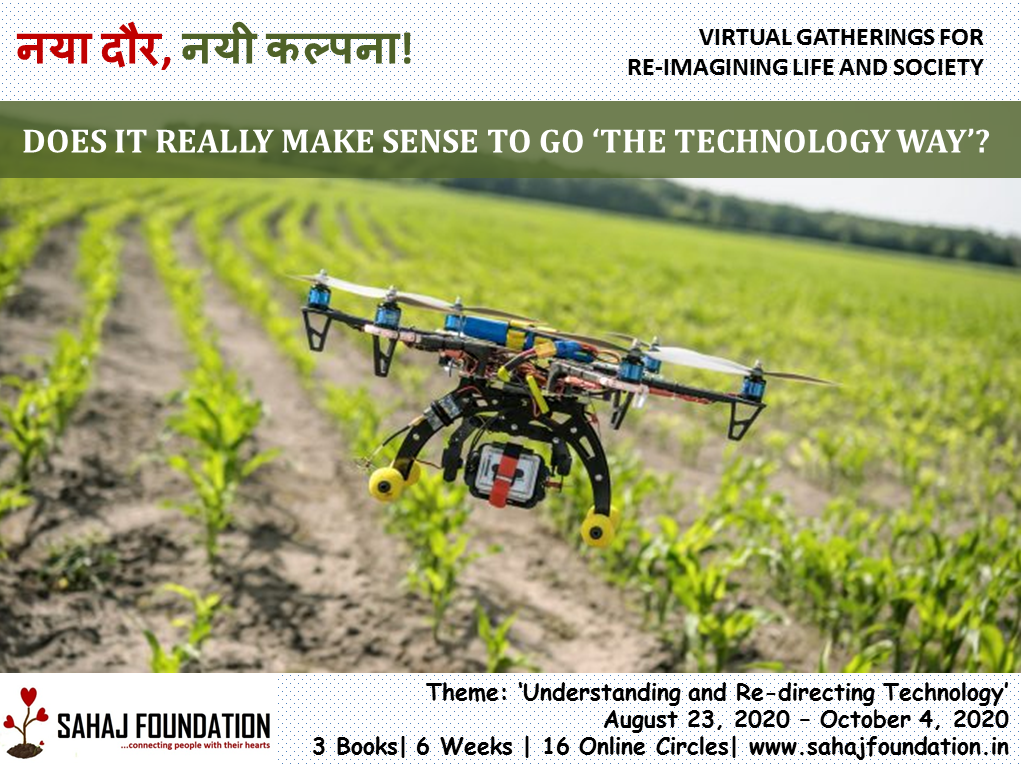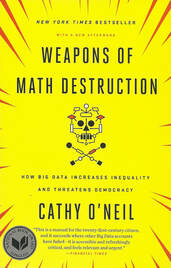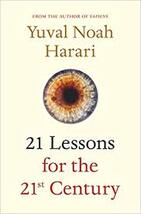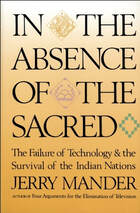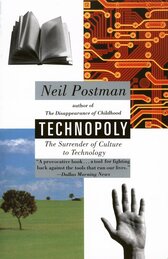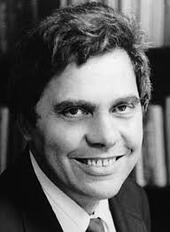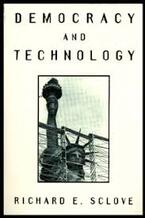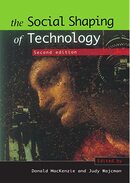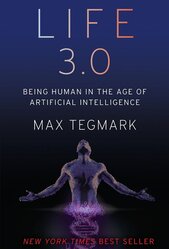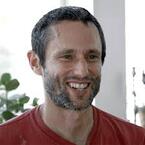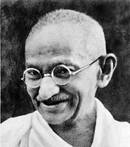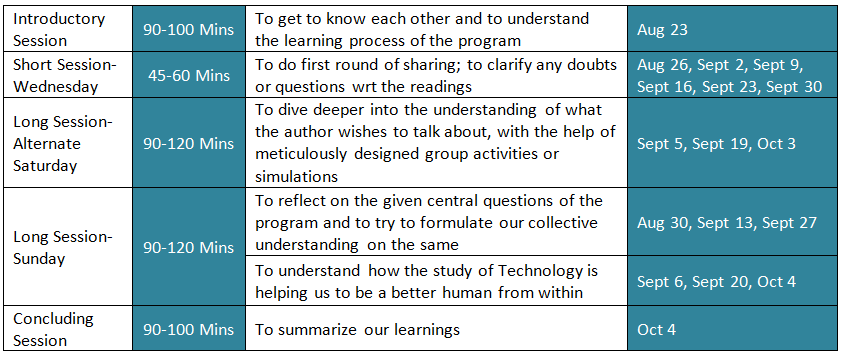नया दौर, नयी कल्पना!
THEME: 'UNDERSTANDING AND RE-DIRECTING TECHNOLOGY'
INTRODUCTION
The ongoing COVID crisis has caused many disruptions at different levels. The world is not what it used to be anymore. Many aspects of life, in different ways, have been interrupted- we are mostly confined to our homes, not able to go to marketplaces or offices; many of us have lost our jobs, with no assurance of getting them back; our kids are not able to play outside, and are also not able to attend their schools; our governments are mostly chocked, in spite of trying their best to manage the crisis; life has become a lot more difficult for many of our companions who are labeled as ‘migrants’ or ‘homeless’.
In these difficult and unpredictable times, though we are alone at home, we are, fortunately, still able to come together through Technology. Many of us have the possibility to work from home, many of our kids are able to remain in touch with their teachers online, and many of our institutions are using virtual mediums to pass on their services to people. Technology has taken a huge leap in the ongoing times, and most of us have, by default, shifted to the new ways of living without reflecting on the possible consequences or side effects.
Is the present Technology taking us and our kids in the right direction? Will it help us, if most of us continue to live our lives online, to remain calm, creative and happy as human beings? Is Technology just a tool, a neutral one, to manage our lives, or is it more than that? Does it come with its own biases and compulsions? Is there any possibility that the Technology we use today may end up taking us in a certain direction that we ourselves are unaware of?
It is time for us to ask these questions. It is time for us to ‘Understand what our Technology is’, how it has developed over time, how it interacts with our social, environmental and economic systems, and what possible consequences it may lead us to, if we continue to indulge ourselves in it as we are doing at present.
The upcoming version of ‘नया दौर, नयी कल्पना’ invites you to ‘Understanding and Re-directing Technology’ theme of the Virtual Gatherings for Re-imagining Life and Society. This 6-week long version of the gatherings shall use different books, research papers, essays and talks to reflect upon following three questions:
Question #1: What are the limitations of our present Technologies? In which direction are these Technologies taking us as a society?
Question #2: How do Technologies interact with the Social, Environmental and Economic spaces? What are the impacts of Technologies on these spaces and vice versa?
Question #3: How can we possibly re-direct our present Technologies, if required, so as to achieve a more equitable, harmonious and peaceful world?
In this whole process of exploring these questions, we shall also seek the support of meditation sessions and a number of meticulously designed group activities to deepen our experience.
In these difficult and unpredictable times, though we are alone at home, we are, fortunately, still able to come together through Technology. Many of us have the possibility to work from home, many of our kids are able to remain in touch with their teachers online, and many of our institutions are using virtual mediums to pass on their services to people. Technology has taken a huge leap in the ongoing times, and most of us have, by default, shifted to the new ways of living without reflecting on the possible consequences or side effects.
Is the present Technology taking us and our kids in the right direction? Will it help us, if most of us continue to live our lives online, to remain calm, creative and happy as human beings? Is Technology just a tool, a neutral one, to manage our lives, or is it more than that? Does it come with its own biases and compulsions? Is there any possibility that the Technology we use today may end up taking us in a certain direction that we ourselves are unaware of?
It is time for us to ask these questions. It is time for us to ‘Understand what our Technology is’, how it has developed over time, how it interacts with our social, environmental and economic systems, and what possible consequences it may lead us to, if we continue to indulge ourselves in it as we are doing at present.
The upcoming version of ‘नया दौर, नयी कल्पना’ invites you to ‘Understanding and Re-directing Technology’ theme of the Virtual Gatherings for Re-imagining Life and Society. This 6-week long version of the gatherings shall use different books, research papers, essays and talks to reflect upon following three questions:
Question #1: What are the limitations of our present Technologies? In which direction are these Technologies taking us as a society?
Question #2: How do Technologies interact with the Social, Environmental and Economic spaces? What are the impacts of Technologies on these spaces and vice versa?
Question #3: How can we possibly re-direct our present Technologies, if required, so as to achieve a more equitable, harmonious and peaceful world?
In this whole process of exploring these questions, we shall also seek the support of meditation sessions and a number of meticulously designed group activities to deepen our experience.
Disclaimer: Please do not expect to have any expert or professional of Technology to be with us during the online gatherings. We shall be on our own, learning from each other while trying to apply our common sense to test the practicality or relevance of the proposed arguments/concepts.
THE BOOKS
The first two weeks of the gathering shall explore Question #1 with the help of following resources:
|
A former Wall Street quant sounds an alarm on the mathematical models that pervade modern life and threaten to rip apart our social fabric!
Weapons of Math Destruction is a 2016 American book about the societal impact of algorithms, written by Cathy O'Neil. It explores how some big data algorithms are increasingly used in ways that reinforce preexisting inequality. It was longlisted for the 2016 National Book Award for Nonfiction and won the Euler Book Prize. Cathy O'Neil is a data scientist and author of the blog mathbabe.org. She earned a Ph.D. in mathematics from Harvard and taught at Barnard College before moving to the private sector, where she worked for the hedge fund D. E. Shaw. |
|
In '21 Lessons for 21st Century', Yuval Noah Harari takes us on a thrilling journey through today’s most urgent issues. The golden thread running through his exhilarating new book is the challenge of maintaining our collective and individual focus in the face of constant and disorienting change.
|
In the Absence of the Sacred, Jerry Mander goes on to critique our technological society as a whole. In this provocative work, he challenges the utopian promise of technological society and tracks its devastating impact on native cultures worldwide. The Western world's loss of a sense of the sacred in the natural world, he says, has led us toward global environmental disaster and social disorder.
|
The third and fourth week of the gathering shall focus on Question #2 while exploring the work of following authors:
|
Neil Postman was an American educator, media theorist, and social critic who made contributions to the discipline of media studies, the critical analysis of technology, and the philosophy of education.
In his witty and often terrifying work of cultural criticism 'Technopoly- The Surrender of culture to Technology', the author chronicles our transformation into a Technopoly: a society that no longer merely uses technology as a support system but instead is shaped by it, with radical consequences for the meanings of politics, art, education, intelligence, and truth. |
|
This eye-opening book by Richard Sclove describes how modern technologies--such as computers, automobiles, machine tools, hybrid crops, nuclear reactors, and others--contribute to vexing social problems ranging from the continued subordination of women and workers to widespread political disengagement.
|
Technological change is often seen as something that follows its own logic - something we may welcome, or about which we may protest, but which we are unable to alter fundamentally. This reader 'The Social Shaping of the Technology' challenges that assumption and its distinguished contributors demonstrate that technology is affected at a fundamental level by the social context in which it develops.
|
The last two weeks of the gathering shall reflect upon Question #3 by taking clues from the following personalities:
|
Life 3.0: Being Human in the Age of Artificial Intelligence is a book by Swedish-American cosmologist Max Tegmark from MIT. The book discusses Artificial Intelligence (AI) and its impact on the future of life on Earth and beyond. It explores a variety of societal implications, what can be done to maximize the chances of a positive outcome, and potential futures for humanity, technology and combinations thereof.
The author is a physicist, cosmologist and machine learning researcher. He is a professor at the Massachusetts Institute of Technology and the scientific director of the 'Foundational Questions Institute'. He is also a co-founder of the 'Future of Life Institute' and a supporter of the effective altruism movement. |
|
Institutes for Technologies of Reunion
In this essay, Charles Eisenstein describes how Technologies of Reunion contribute to the reunion of human and nature, mind and body, thought and emotion, matter and spirit, modern and ancient, masculine and feminine. They reunite all that which has been made artificially separate or even placed into opposition in the civilization of separation. |
Gandhi and the concept of Alternative Technology: In this journal article by K Gopinathan Pillai, the author highlights that there was no dichotomy in spiritual and material in Gandhian thought. His view of Technology, therefore, is closely interwoven with his general political philosophy which in turn is closely interlinked with his moral principles.
|
TIMELINE
Sunday, August 23, 2020 – Sunday, October 4, 2020
We shall meet five times in two weeks, twice for short sessions (45-60 Mins; Wednesdays) and thrice for long sessions (90- 120 Mins; Saturday (alt) and Sundays) as per the following schedule:
We shall meet five times in two weeks, twice for short sessions (45-60 Mins; Wednesdays) and thrice for long sessions (90- 120 Mins; Saturday (alt) and Sundays) as per the following schedule:
The timings of the sessions shall mostly be either 05:00 – 07:00 PM slot or 07:00 to 09:00 PM slot, depending upon the participant’s availability.
Kindly note that this whole program requires you to devote approximately 90 minutes every day to continue your reading of the books, essays, papers etc on your own. Therefore, please be a part of this adventure only if you are fully committed to the cause from within.
Kindly note that this whole program requires you to devote approximately 90 minutes every day to continue your reading of the books, essays, papers etc on your own. Therefore, please be a part of this adventure only if you are fully committed to the cause from within.
BATCH SIZE
Around 12-20 participants. We wish to a have a small group with more time per participant.
ELIGIBILITY CRITERIA
Anyone- of any age, gender, nationality, background, work experience- is invited to participate in this program as we wish to have as much diversity as possible. All we would require from our side is for you to have an interest for reading books, a spark to understand Technology and an intention to dive deeper into the possibilities of re-directing the same.
APPLICATION PROCESS
Kindly use this link to fill the application form: www.sahajfoundation.in/application-form-for-ndnk
We may choose to speak to you over phone before finalizing your participation in this program.
We may choose to speak to you over phone before finalizing your participation in this program.
FINANCIALS
The suggested range of contribution is Rs 5,000- Rs 12,000. The participants are encouraged to contribute as per their heart and financial situation. The ones who are capable of contributing on higher side are encouraged to do so, as we also wish to accommodate a few individuals who are not in a position to contribute financially. The charges cover facilitation for all 43 days, which include 16 compulsory virtual sessions as mentioned in the schedule.
FREQUENTLY ASKED QUESTIONS (FAQs)
1. Are we going to read all the books mentioned above?
Yes and No. We shall read three books namely 'Weapons of Math Destruction', 'Technopoly' and 'Life 3.0' fully. The other books mentioned shall be covered partially (a few chapters). As already mentioned, the focus of the program is to explore answers to the provided central questions with the help of these resources. Therefore, we shall go through these resources only as per the requirement.
2. Is it just a book reading program?
No, it is not. The program aims to use the books, essays, papers and talks etc as its guiding light while the sessions aim to go deeper into ‘Understanding and Re-directing Technology’ with the help of three central questions provided above. The sessions shall also focus on the personal growth of its participants.
3. Can I skip some online sessions?
We would strongly suggest you to not skip any session (16 in total; 6 Short + 10 long sessions) as these sessions shall build upon each other. However, it would be optional for you to participate in any additional session that may come up during to the course of the program.
4. Will the recordings of the sessions be available?
No, the recordings shall not be available for later review. Kindly be present and fully attentive during the sessions.
5. Can I join the program in between say after a week from the beginning or so?
Though we would encourage you to join the whole program for its six week duration, it would be possible for you to join the program in-between either on Sept 6, 2020 (when exploration for Question #2 starts) or on Sept 20, 2020 (when exploration for Questions #3 starts). Your joining shall however depend on the number of seats available.
6. What if I have already read any book(s)/resources mentioned on the program page?
As already mentioned, this program is not only about reading books. The program aims to delve deeper into the three provided central questions as well as personal growth. Therefore, we would encourage you to still consider your participation in this adventure.
7. Can I also suggest any book/resource from my side to be taken up for the reading?
Yes, you can do so during the whole course of the program. However, all the participants shall collectively decide whether they wish to go through the resource or not.
8. Will you buy these books/resources on my behalf?
No, we shall provide you with the soft copies of the books/resources from our side. If you prefer to have physical copies of these books for reading, we would encourage you to kindly buy the books on your own.
9. If there are only two/three sessions per week, how am I supposed to give 90 minutes per day to this program?
The online circles are more about sharing and learning from each other’s reflections. You would be required to go through the whole books/resources on your own by devoting dedicated time for the same on daily basis. Also, kindly note that you are encouraged to read slowly and spend a lot more time doing self-reflection.
10. What are the other possible timelines for the online sessions?
If the evening slots do not work out, we may choose to have our sessions in the daytime preferably with these slots: (11:00 – 12:30 AM), (02:00 – 03:30 PM).
Yes and No. We shall read three books namely 'Weapons of Math Destruction', 'Technopoly' and 'Life 3.0' fully. The other books mentioned shall be covered partially (a few chapters). As already mentioned, the focus of the program is to explore answers to the provided central questions with the help of these resources. Therefore, we shall go through these resources only as per the requirement.
2. Is it just a book reading program?
No, it is not. The program aims to use the books, essays, papers and talks etc as its guiding light while the sessions aim to go deeper into ‘Understanding and Re-directing Technology’ with the help of three central questions provided above. The sessions shall also focus on the personal growth of its participants.
3. Can I skip some online sessions?
We would strongly suggest you to not skip any session (16 in total; 6 Short + 10 long sessions) as these sessions shall build upon each other. However, it would be optional for you to participate in any additional session that may come up during to the course of the program.
4. Will the recordings of the sessions be available?
No, the recordings shall not be available for later review. Kindly be present and fully attentive during the sessions.
5. Can I join the program in between say after a week from the beginning or so?
Though we would encourage you to join the whole program for its six week duration, it would be possible for you to join the program in-between either on Sept 6, 2020 (when exploration for Question #2 starts) or on Sept 20, 2020 (when exploration for Questions #3 starts). Your joining shall however depend on the number of seats available.
6. What if I have already read any book(s)/resources mentioned on the program page?
As already mentioned, this program is not only about reading books. The program aims to delve deeper into the three provided central questions as well as personal growth. Therefore, we would encourage you to still consider your participation in this adventure.
7. Can I also suggest any book/resource from my side to be taken up for the reading?
Yes, you can do so during the whole course of the program. However, all the participants shall collectively decide whether they wish to go through the resource or not.
8. Will you buy these books/resources on my behalf?
No, we shall provide you with the soft copies of the books/resources from our side. If you prefer to have physical copies of these books for reading, we would encourage you to kindly buy the books on your own.
9. If there are only two/three sessions per week, how am I supposed to give 90 minutes per day to this program?
The online circles are more about sharing and learning from each other’s reflections. You would be required to go through the whole books/resources on your own by devoting dedicated time for the same on daily basis. Also, kindly note that you are encouraged to read slowly and spend a lot more time doing self-reflection.
10. What are the other possible timelines for the online sessions?
If the evening slots do not work out, we may choose to have our sessions in the daytime preferably with these slots: (11:00 – 12:30 AM), (02:00 – 03:30 PM).
FACILITATOR'S PROFILE
Ashish Kumar
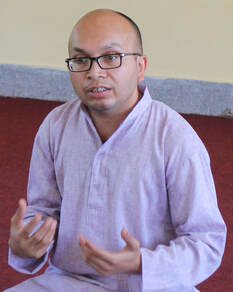
Ashish graduated from Indian Institute of Technology (IIT), Roorkee in the field of Electrical Engineering in 2009. Post studies, he pursued his corporate career for a few years before deciding to move on to his passion to work with rural communities. Since then, Ashish has lived in the villages of Gujarat and Himachal Pradesh and worked for many rural projects related to Education and Livelihood sector. Before founding Sahaj Foundation in 2013, he also worked with Indian Institute of Technology (IIT) Mandi to help set up their ‘Centre for Innovative Technologies in Himalayan Region’.
Presently, Ashish lives a simple and peaceful life in Bir village situated in Kangra District of Himachal Pradesh. He has chosen Education as his primary medium of service while he continues to explore more on organic farming and holistic healing with an aim to simplify his lifestyle and benefit the society as much as possible.
For past four years, Ashish has been conducting many dialogues and workshops on the theme of 'Rethinking Development'. He has so far facilitated such processes for hundreds of professionals and students. He strongly believes that there is a need to create spaces wherein people can develop their abilities to think critically and understand the world by using their own experiences. This online program is his another effort to do just that!
Presently, Ashish lives a simple and peaceful life in Bir village situated in Kangra District of Himachal Pradesh. He has chosen Education as his primary medium of service while he continues to explore more on organic farming and holistic healing with an aim to simplify his lifestyle and benefit the society as much as possible.
For past four years, Ashish has been conducting many dialogues and workshops on the theme of 'Rethinking Development'. He has so far facilitated such processes for hundreds of professionals and students. He strongly believes that there is a need to create spaces wherein people can develop their abilities to think critically and understand the world by using their own experiences. This online program is his another effort to do just that!
For more information, write to Ashish Kumar (sahajfoundationinfo@gmail.com) or call him on +91 88948 93083

